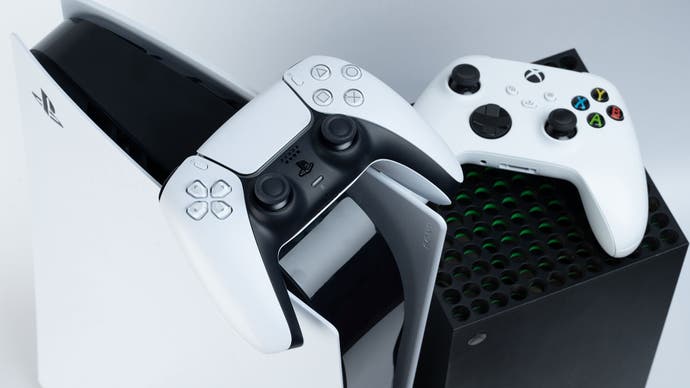Thick Thighs Save Lives
NeoGAF's Physical Games Advocate Extraordinaire

On paper, the Xbox Series X is a considerably more powerful piece of hardware than PlayStation 5, so why are we looking at a console generation where the Sony and Microsoft machines often deliver like-for-like results? It's a puzzle that has confounded many over the last few years and after discussions with multiple sources, including some of the highest profile triple-A developers in the business, we finally have some answers - and it's all laid out in this week's edition of DF Direct Weekly.
In terms of technical specifications, Xbox Series X is undoubtedly the most powerful console on the market - at least until the mooted PlayStation 5 Pro arrives. Its GPU hits 12 teraflops, augmented by a handsome amount of memory bandwidth: a max of 560GB/s. PlayStation 5? 10.23TF of GPU compute is available, fed by 448GB/s of bandwidth. It's a clear divide then. If we were to see that spec comparison in the PC space, you'd expect to see the former handily outperform the latter.
Except that hasn't happened this generation. By and large, it's the closest console generation we've ever seen and in the bulk of multi-platform releases, the differences are fairly minimal. One machine may outperform the other, or vice versa. Sometimes where there are differences, it comes down to variances in dynamic resolution scaling - which often looks invisible in A to B comparisons. It's a far cry from the Xbox One X vs PS4 Pro face-off, where the Microsoft machine commanded an obvious advantage - or the PS4 vs Xbox One comparison, where Sony typically held a similarly noticeable lead.
So, after a few years of conversations with developers, what's the explanation? How can a less capable machine outperform the more powerful one? As seen recently in our Elden Ring: Shadow of the Erdtree coverage, the frame-rate difference in favour of PS5 is surprising, bearing in mind it's apparently the less capable machine.
We've heard some interesting theories over the years - such as how Xbox Series X's split-memory set-up (560GB/s of bandwidth on 'fast' memory, 336GB/s on 'slow' memory) may be impacting performance, but the number one reason we've heard from developers concerns the nature of Sony's development environment. More than one key triple-A developer tells us that the PlayStation GPU compiler is significantly more efficient than the Microsoft alternative, meaning that there's better utilisation of the graphics hardware. In general, we understand that the lower level API access afforded to PlayStation development means game makers get more from the hardware.
The second most common explanation we've received from developers concerns the nature of the GPU itself. Mark Cerny himself discussed this way back in March 2020 when he revealed the technical specifications of the PlayStation 5. While the console may have fewer compute units than Xbox Series X - 36 vs 52 - the entire GPU runs faster, meaning that certain tasks will complete faster, better suiting certain game engine designs. The extent of this advantage was always an unknown as PS5 operates with a boost clock on both CPU and GPU - maximum clock speeds will be limited by a power limit on the processor.
However, we've yet to hear any complaints from developers about the boost clock unduly impacting GPU performance. And in terms of raw numbers, there's an interesting titbit from the recently leaked PlayStation 5 Pro developer documentation: engaging the CPU boost option, which increases clock speeds by ten percent, only sees GPU performance drop by one percent - effectively negligible then.
So, based on our conversations, the combination of a more efficient GPU compiler, lower-level APIs and higher clock speeds allows PlayStation 5 to match or even exceed the outputs of Xbox Series X in some scenarios. That said, of course there is value in the approach Microsoft has taken: by standardising on DirectX 12 and the DXR ray tracing API, there is a commonality with PC development that obviously helps game makers. And of course, Xbox does still have more compute throughput - so game engines that tap into that will see advantages. Additionally, there are situations where the Xbox ecosystem and feature set yields dividends. For example, while Elden Ring may run faster on PlayStation 5, Sony's limited implementation of variable refresh rate support means that we'd much rather play the game on Xbox Series X - it's just a smoother and more consistent experience.
At this point, having heard the same set of points from a range of entirely unrelated developers means it's effectively case closed on this particular topic - and we expect to see a similar situation play out across the rest of the generation. PlayStation 5 Pro? That's going to be interesting. We'd expect it to lean into the same strengths that made PS5 competitive and go beyond - PSSR machine learning-based upscaling should act as an effective 'multiplier' of sorts on its increased GPU performance.

DF Weekly: If Xbox Series X is more powerful, why do some PS5 games run better?
We finally have some answers
Last edited:















